#childism cw
Explore tagged Tumblr posts
Text
More tags for reach under the cut
@selkiebrides @streakoflavender @keepinitwrd
@bloodandgutsyippee @wherethatoldtraingoes2
@butchniqabi @frigidwife
@vetted-gaza-funds @gazagfmboost @heliopixels
@neechees @beserkerjewel @brutaliakhoa
@deepspaceboytoy @kibumkim @rhubarbspring
@lesbiansagainsttheatre @malcriada @applejupiter
@sxpph0 @rebel-girl-queen-of-my-world @neptunerings
@dykesbat @halalgirlmeg @userpeggycarter
@brokenbackmountain @minosbull @magnus-rhymes-with-swagness-blog
@buttercuparry @captainsaltymuyfancy @timetravellingkitty
@socalgal @xinakwans @kahin
@arsonistbunny @cloudster-clown @cosmos-hime
@diddykong-racer @teaviary @typhra
@daxdraggon @skittybot @lesbiannova
@fleshdyk3 @irangp @bitegore
@lsbianmaxevans @frustrated-froglet
@1stuffedtiger @boosting-donations @politicalblade
@its-feminism-not-terfism @rainy-fog @officialpenisenvy
@opencommunion @pannaginip @postanagramgenerator
@redbuddi @retvolution @riding-with-the-wild-hunt
@shartreuse1312 @sissa-arrows @sivavakkiyar
@sliceofdyke @soon-palestine @stuckinapril
@t4tails @tadpoledyke @tamamita
@thatdiabolicalfeminist @think-queer @timetravellingkitty
@timogsilangan @trans-girl-nausicaa @transingthebourgeoisie
@transjjester @turian @ubernegro
@vague-humanoid @vakarians-babe @victoriawhimsey
@womenintheirwebs @yurischolar @2spirit-0spoons
Updated today !
19/11/2024 Save my child, Mira, please
My beautiful baby Mira was suffering from a high temperature two weeks ago, so I took her to the doctor at Al Awda Hospital in Nuseirat Camp, which is the only hospital covering the central region. The doctor told me: There is nothing wrong with your child without examination or tests.
He literally told me your child is spoiled
When I got out of the hospital, I told my wife that our baby girl was spoiled, just like the doctor said
Every time my child, Mira, complains of pain, I tell her there is nothing you need, and when her temperature rises, I give her a fever reducer and she just sleeps.
This morning, my wife was surprised while she was changing clothes for Mira that there was a large tumor under her armpit
My wife started screaming and crying at me. I took Mira to the hospital immediately and we were referred to a pediatric surgeon. She was examined and a television imaging was done. It was found that my child suffers from three masses in the lymph nodes, one of which is very large.
The doctor told me that she needed a gland removal operation As soon as possible within a week due to the rapid growth of the tumor
My child, Mira, is one of the most active and energetic children today. She is sick and cannot play. She's tired. I don't like to see her in this state.
Since we received the news, my wife and I have been crying. We do not know how to react. What will happen to us next in this damned war?
There are no hospitals, no electricity, no treatment, and not even anesthesia for surgical operations
I don't know how to act
My child, Mira, needs an operation and quick treatment
Please help me, my hands are tied 🙏😭
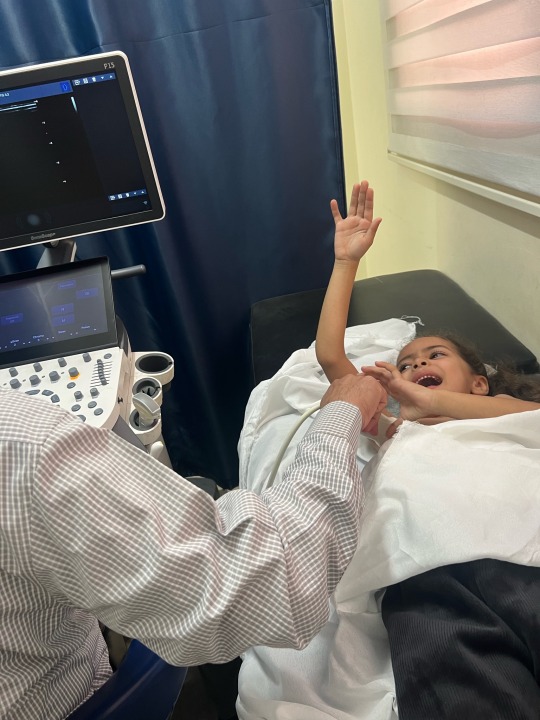
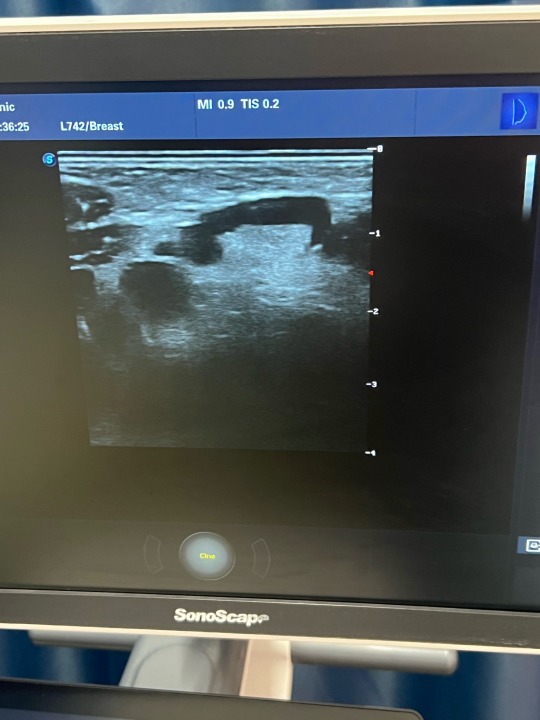
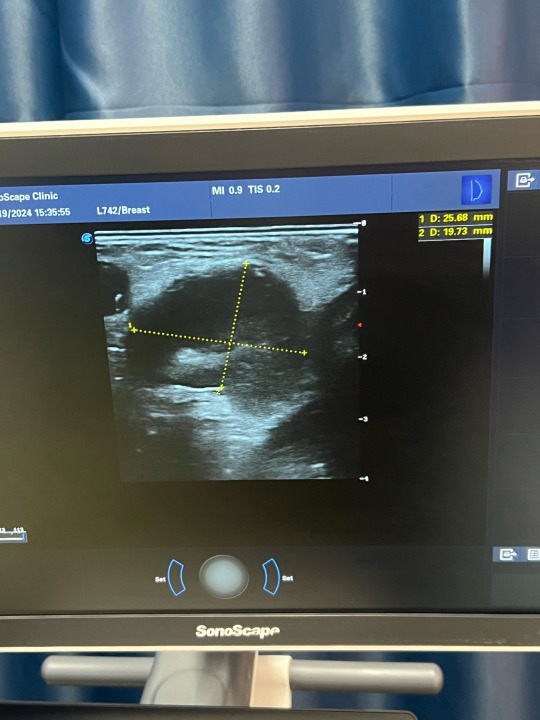
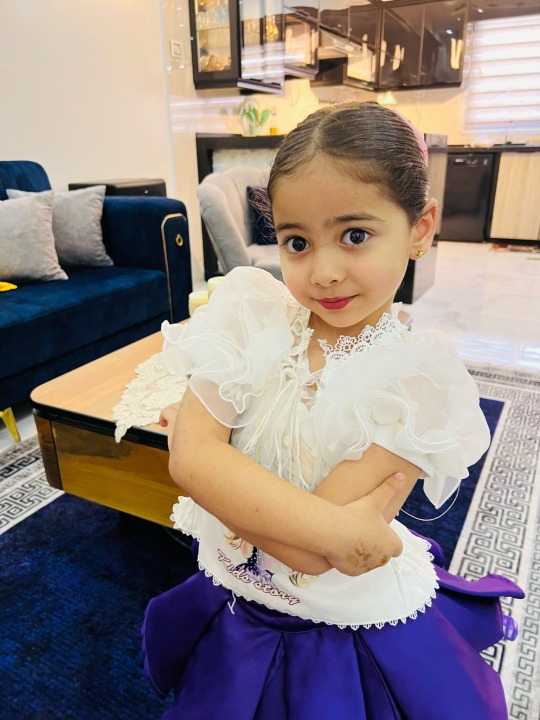
@palhelp @shinydreamtacoprune-blog @mistress-- kanzaki @a-shade-of-blue @rainy-fog
@gryficowa @good-old-gossip @ashwantsafreepalestine @heritageposts @myceliacrochet
@loathsome-little-creature @nezreblogs @liatkolink @teto110 @gaza-evacuation-funds
@autisticmudkip @taamita @90-ghost @gazavetters @neechees
@butchniqabi @fluoresensitive @beserkerjewel @khanger @furiousfinnstan
@xinakwans @batekush @appsa @nerdyqueerr
@butchsunsetshimmer
@biconicfinn @stopmotionguy @willgrahamscock @strangeauthor @bryoria
@shesnake @legallybrunettedotcom @lautakwah @sovietunion @evillesbianvillain
@antibioware @akajustmerry @dizzymoods @ree-duh @neptunerings
@explosionshark @dlxxv-vetted-donations @vague- humanoid @buttercuparry @sayruq
@malcriada @sar-soor @northgazaupdates2 @feluka @dirhwangdaseul
@jdon @ibtisams @sawasawako @memingursa
@schoolhater
@toesuckingoctober @waskuyecaozu @lapithae @ryo-yamada @opencommunion
@el-shab-hussein @feluka @paper-mario-wiki @imiustheretotrvtohelp @iranan
@c-u-c-my-4-40k @wellwaterhysteria @stuckinapril @boochanz @cantsayidont
410 notes
·
View notes
Text
I’ve been looking at the BITE model of control and noticed some similarities to adultism/patriarchal power structures.
I’m not saying that schools/nuclear families/etc are necessarily cults, but rather that cult-like methods are used in enforcing adultist power structures.
Although many items in this list could apply depending on the circumstances, I highlighted in green the ones that seemed most relevant.
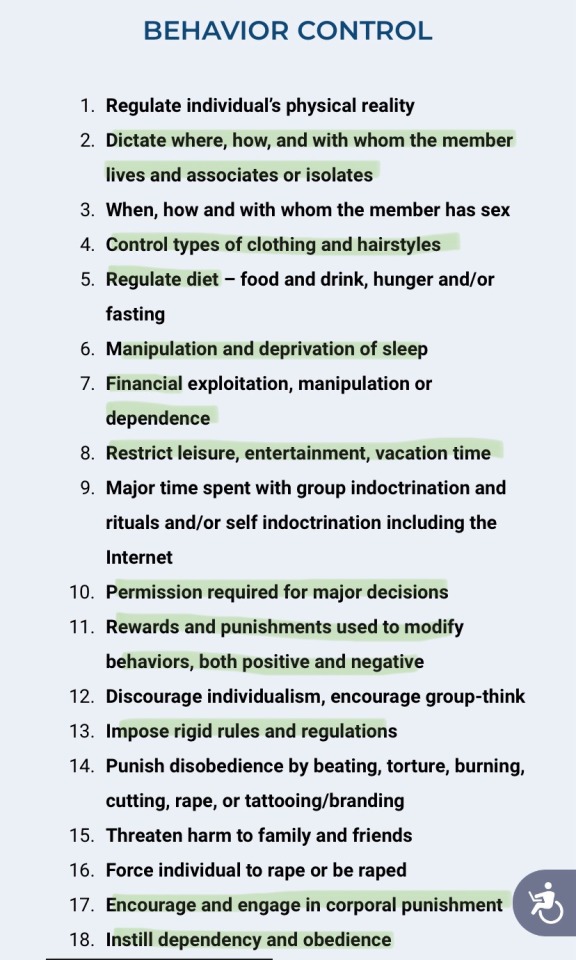
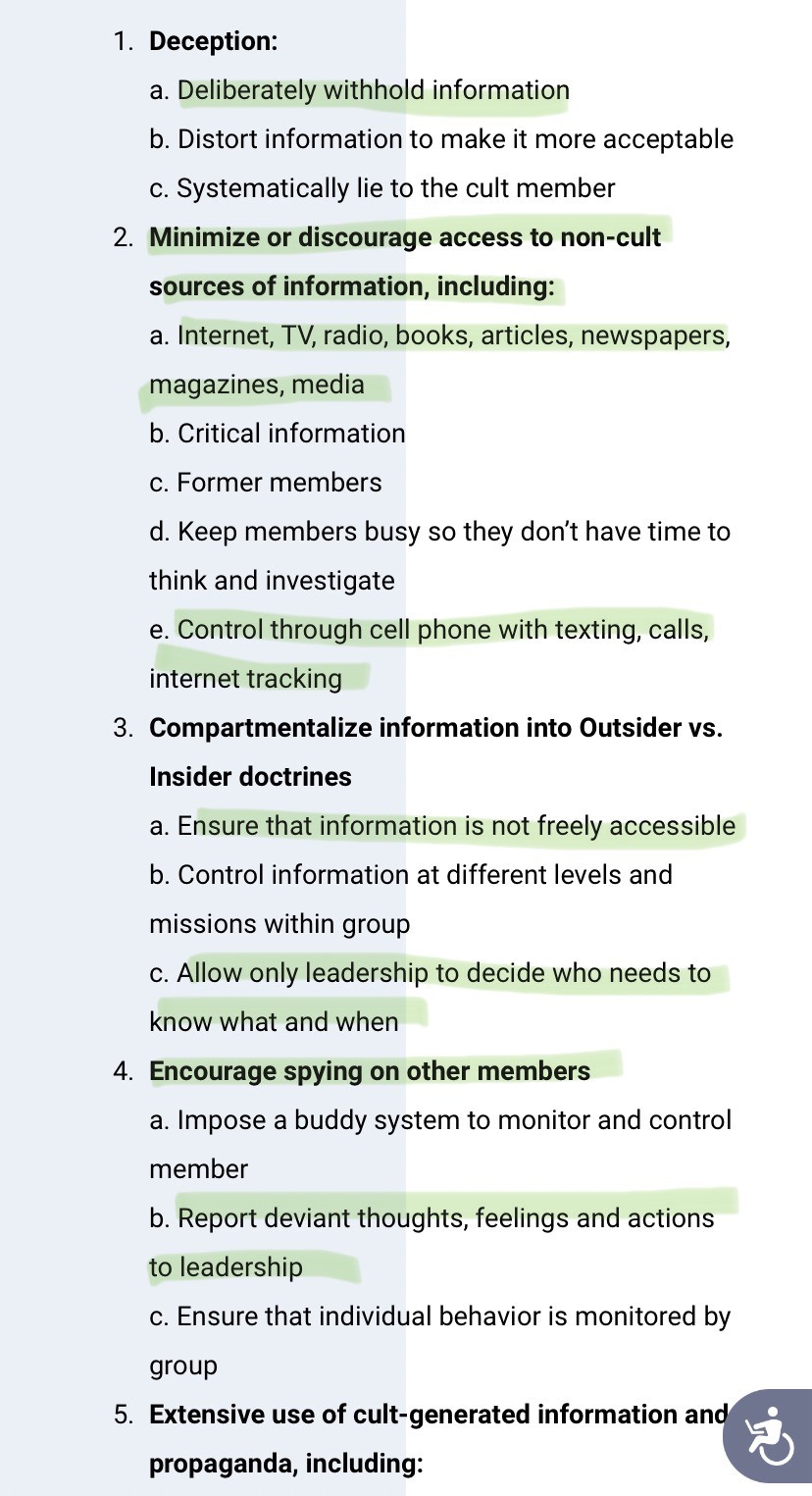
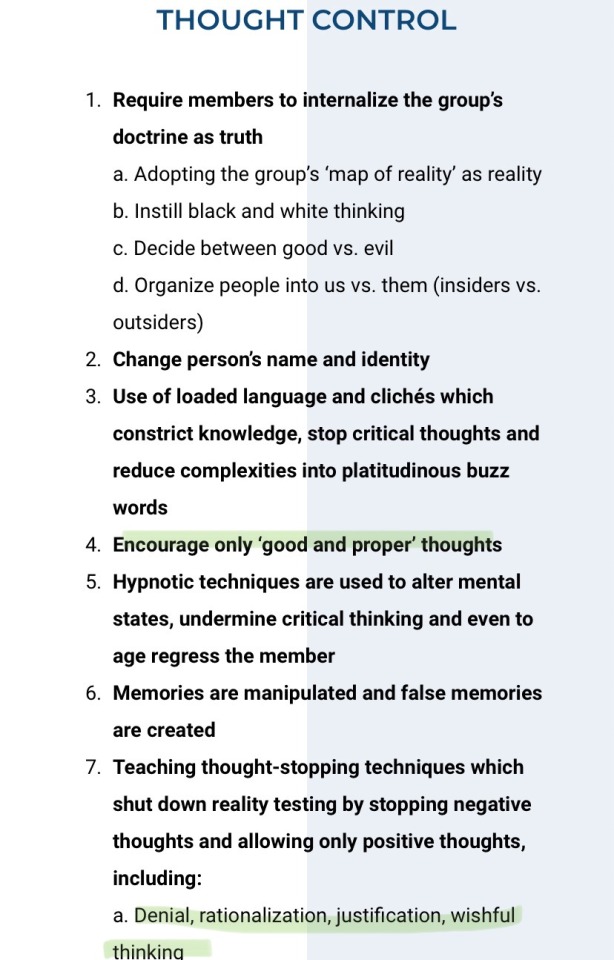
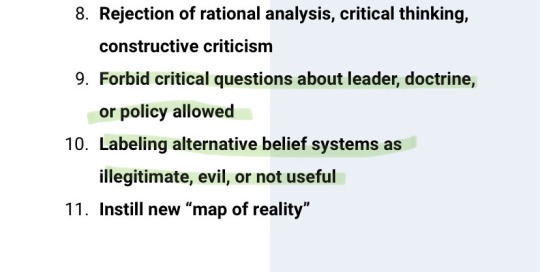
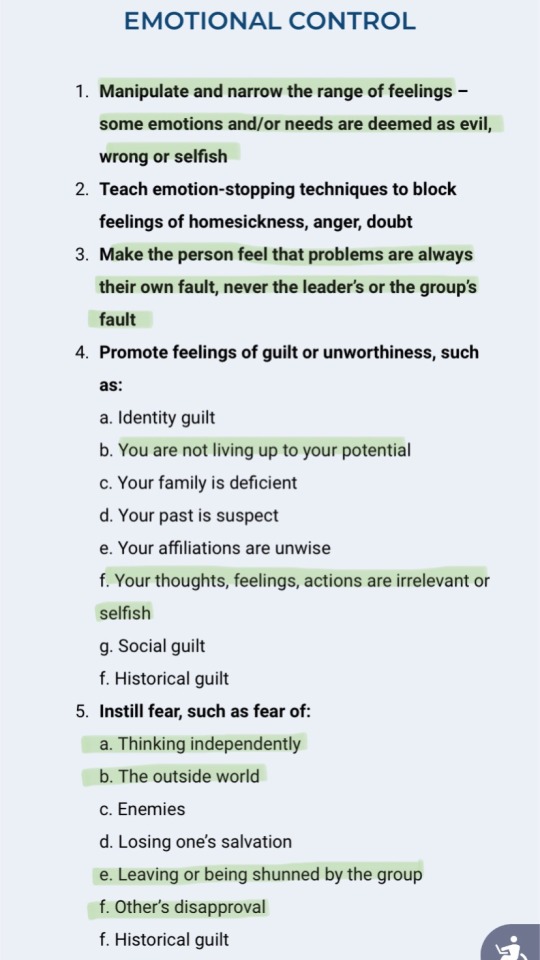
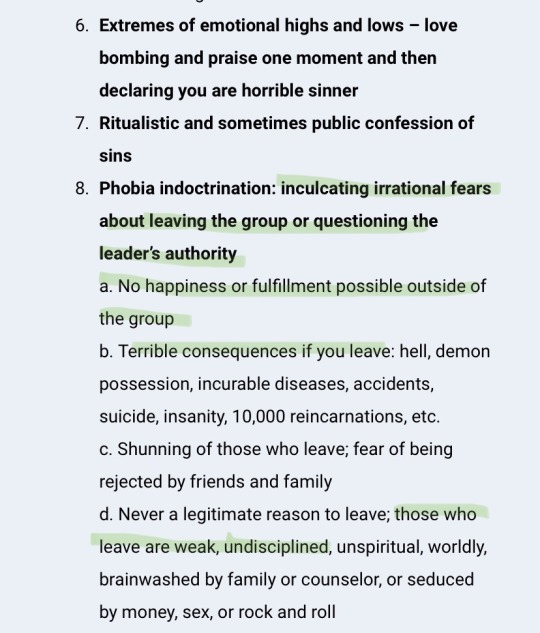
#please add more#childism#adultism#bite model of control#Cult like thinking#cw cults#cults#social issues#leftism#child rights#youth lib#youth rights
171 notes
·
View notes
Text
The hatred of children is so fucking real, and I am so sick of it.
I just saw a video of a tiny baby who was crying because they had gripped onto their own hair but didn't know to let go, and the comments were full of people saying "I hate kids, omfg". Like, ??????? Fuck off????
Look, you can not like kids, I don't really like kids that much, but this is fucking ridiculous. It's a fucking baby that doesn't know how to ungrip their hair, fucking grow up! And
LET! CHILDREN! EXIST!!!
24 notes
·
View notes
Text
https://twitter.com/aubedete/status/1581134299780513792
Re: the “youth liberation” people.
I figured it out. They’ve invented a theory of guardianship that does not exist in their cultural or legal context to get mad about.
If “children as literal property” is what they have a problem with, I've got great news!
“Does not exist in their cultural or legal context”
Most of these people [online, in this specific discourse sphere?] are Americans. In most American states, parents can beat their children. In most American states, parents can medically neglect their children to death if it is for a religious reason.
In a lot of those states, parents can give off their children as brides. Send their children to conversion therapy. To places like the TTI (if you aren’t a youth liberationist after reading about the troubled teen industry you are just not a human being). Withhold information from them. Treat them in any way they see fit short of actual murder basically.
Yes, children are property in America. Not even the basic protectionist principles of the UNCRC are applied.
Shut the fuck up, you wouldn’t survive a day if you were turned back into a minor.
The things you take for granted, your right to privacy, your right not to be physically harmed, your right to a political voice, your right to your own opinions are something children in all of the Western world as well as in the global south DO NOT HAVE. “Guardianship” my ass. Most parents are prison wardens.
(Also, do I even need to point out that this is a racist dogwhistle of the same sort as “What do western feminists have to complain about? Patriarchy doesn’t even exist in the West” both downplaying the violence experienced by women in the minority world and implying that the “real” misogynists are those brown people, not us good whites.)
#repost of someone else’s content#Alba M.#adultism#ageism#youth oppression#childism#child abuse cw#child abuse apologia#child abuse apologia cw#adultism cw#parental abuse#parental abuse apologia cw#patriarchy#misogyny#feminism#youthlib#youth liberation#youth rights#racism#white supremacy#relativism
21 notes
·
View notes
Text
Also there is no such thing as "just a tantrum" at all.
I sat with a crying second grader today. (The age range is outside my wheelhouse but I was the most convenient adult.) He was crying, the other adults said, because his brother took a phone he was playing on. “Phone addicted,” everybody said. “If he would get up and play games with the other kids he wouldn’t be crying.”
He told me everyone lets his brother take things from him because his brother is younger, and doesn’t know better. He told me he doesn’t want to play because he’s tired, he has too many extracurriculars this summer and can’t get good sleep because “everyone in my camper is so loud when I’m trying to sleep.” He’s exhausted and only eight. His mom’s an acquaintance and told me she and the kid’s father are going through a separation — mom and four kids left the house to stay in a camper.
But people will seriously not listen to kids crying over seemingly minor things because on the surface it looks like a tantrum. If kids are given the space to articulate themselves they often will.
87K notes
·
View notes
Text
copying anon over here because i went to save the ask to my drafts and tumblr sent it directly to the shadow realm, welp:
I dug through your rambles about Hermes, so I'm looking forward to thoughts on Erich with the ancient world's everything lol ~
ahhhh thank you, i'm glad you've enjoyed my rambles so far!! i've been taking the second half of the pandaemonium arc more slowly, partly because i'm been Out of It the last few days and partly because the direction the plotline with erich and lahabrea has taken a turn for has been leaving a really bad taste in my mouth. i've been making my way through it, though, and percolating Deeply on the He and how he and pandaemonium as a whole fit into all this. spoiler alert i love him even more now
(on the one hand, it finally helped me articulate some points that imo make or break an 'abusive parent sees the error of their ways and apologizes up and down and swears to do better, and both that and the context in which the abuse happened leave their victim feeling conflicted about it' arc. so there's that! on the other hand it, uh. it did so by very much being the goofus here lmao, and erich deserved better.)
(the way the whole thing is played off is also just, deeply deeply misogynistic. athena is top-tier nastywoman and i love her for it, and 'mothers--in particular white women, especially to their children of color--can be shitty and predatory and abusive and are accountable for it full stop,' is great abuse rep but fucking WOWZERS)
(which like, i will say that the overtones are not at all lost on me that athena repeatedly goes out of her way to prey on, abuse, and violate not just men of color but black men; dehumanizes them and treats them and their bodies as her property; and is strongly implied to have sexually abused erich in particular. and how the one who gets the brunt of it is her biracial, very VERY not white-passing son, who she isolated from the black side of his family to do whatever she wanted with. it is insanely fucking refreshing to see that shit not cushioned at ALL, and it really sucks that that had to come bundled in with the abuse apologia and misogyny.)
(i am also realizing that this is one of the reasons erich whitewashing, and how common it is in the fandom as well as official art, bothers me so much beyond the obvious. while it's uncertain how much of it was intentional, his narrative evokes not just real-world racism but colorism, and a specific brand of it and how it intersects with abuse. even if just on a doylist level erich was abused for being as dark-skinned as he is, and erasing that is even shittier than your run-of-the-mill whitewashing.)
(anyway. ANYWAY. anyway. all that is a post of its own and i haven't even gotten to the parts about ancient society yet. you see what i mean by having a lot of thoughts about him lmao)
i'm hoping to finish the last leg of the questline tonight so i can start fully putting my thoughts together because god there is SO MUCH, and i'm excited even if i foresee having to grit my teeth through the rest of the moments between him and lahabrea lmao
#final fantasy xiv#ffxiv#ffxiv erichthonios#ffxiv athena#ffxiv lahabrea#thank you anon!! the preview for the notification almost gave me a heart attack and this was really nice to open it and find instead lmao#asks#anonymous#the crit files#ffxivcrit tag#abuse cw#abuse apologia cw#CSA mention cw#SA mention cw#racism cw#incest mention cw#(incidentally athena is a perfect example of why i'm so wary of 'teehee i love evil women and support women's wrongs' in fandom these days)#(it really sucks to have to give so much of Enjoy Fucked Up Lady Blorbos for Being Evil and Stop Holding Double Standards About It)#(fandom such a wide berth; but holy shit it is a *cesspool* of racism and childism and rape/abuse apologia)#(from people who want a single-issue pass to be bigoted; and DARVO and direct harassment at people who try to call it out)#(instead of applying any kind of nuance or intersectionality or critical thought)#(and it's how you get shit like people cheering on their white blorbo's Evil Girl Power for sexually abusing men of color lmao)#(i have conflicted feelings abt both athena's portrayal and erich as abuse rep but holy shit it's been such a relief to see none of that)#(any other fandom would be a radioactive nightmare zone about this and thank fuck it isn't)#ANYWAY i do indeed have Manythoughts about him and am looking forward to being able to put them together cogently#FF tag#ffxivtag#the salt files#warning: worm grass#pandae pilled anon
7 notes
·
View notes
Text

"ThErE iS a GuLf A mILe wIdE bEtWeEn DiScIpLiNe AnD aBuSe."
If I had a dime for every time someone uses a version of that trite phrase to excuse abusive behavior, I'd be hella rich right now. From my understanding, any adult can get away with pulling all sorts of fuckshit stunts on children under the guise of "discipline". That alone is scary enough. Since I see no point in going back and forth, let alone being nice about this topic, this person won't be tagged.
What exactly do you mean by discipline? As in children unquestionably obeying commands? Silent, obedient children doesn't mean they're happy, socialized, let alone "good". Most people tend to conflate discipline with punishment. The latter party treads into abusive territory. Blind trust & obedience are what make them susceptible to predators unscrupulous characters. Those unscrupulous characters are people the victims know and trust. I personally think power plays a role in this. There's plenty of power-hungry adults who can't wait to go on a power trip.
Fun fact: public school CorPun is legal in 19 states, especially in the Bible Belt. For private schools, it's legal in ALL states except for New Jersey and Iowa.
Of course there's a difference between the two. However, discipline does NOT involve deliberately inflicting bodily harm & discomfort. As previously stated, one too many people conflate discipline with punishment. Interesting how it's only adults who seem to care about making categories, splitting hairs over differences. Whereas a child's brain doesn't know, nor does it give a shit about "differences". Their brains don't stop to think "it's only a spanking ‐ just halt your fight/flight/fawn response and shut down the cortisol production".
Do you stop to think about why children are "disrespectful"? That those particular students are the ones receiving less than stellar treatment at home? Let's be honest, a lot of you use the "disrespectful" label to describe students who are possibly disabled, neurodivergent and/or have other special needs. Black children are also more likely to be on the receiving end of maltreatment. Chronic exposure to high cortisol levels thanks to CorPun fucks up their brain development. How can you expect children to learn anything if you SOBs are constantly whacking the grey matter out of them? I'm gonna need people like pixelexplorer to sit down and STFFU spewing these beaten-down arguments. *no pun intended*
Since you think you're a disciplined person, don't get upset when people start knocking your lights out like a child when you fuck up. I mean it's only fair. Thanks for proving my point ya fucking numbskull.
#stop hitting kids ya fucking troglodytes#adultism#childism#cw child abuse#youth rights#adult supremacy#not this shit again#here we fucking go#fragile parents#youth liberation#why just why
47 notes
·
View notes
Text
from “A New Age of Understanding: Allowing Self-Defense Claims for Battered Children Who Kill Their Abusers”
Jamie Heather Sacks 1994
Journal of Contemporary Health Law and Policy Volume 10 Issue 1 Article 25
Abused children who commit parricide are presented as criminals, yet surely they are victims first.
The shocking crime of parricide, the murder of a parent or close relative by a child, accounts for roughly 300-400 homicide cases each year in the United States. The notion that children could kill their parents is difficult for most people to accept. When children commit parricide, however, the crime often follows a lifetime of severe abuse that the children can no longer psychologically tolerate. Abused children view killing their parents as the only way to end the abuse.
Children who commit parricide often feel alienated by the courts, which they look to for justice. When these children assert self-defense to justify their actions, courts frequently reject the defense because it does not conform to classic self-defense theory, which encompasses only those who kill when confronted by an immediate and obvious threat to their lives. Children who kill their parents, however, normally strike when parents are the most vulnerable, such as when they are sleeping or when their backs are turned. Courts must recognize that in the mind of an abused child, “the imminent danger is more subtle and is only perceptible to an abused child.” Self-defense would then be available to a child who commits parricide as an effective defense, as in any other homicide case.
Once a self-defense claim is allowed, expert testimony is needed to aid the jury in interpreting the reasonableness of the child’s belief of imminent danger. Because the average juror has not been exposed personally to the physical and psychological effects of the abuse, he or she cannot understand the dynamics of the complex relationship between a batterer and a victim. A layman usually cannot comprehend the impact long-term abuse has upon a child’s emotional and psychological responses. Accordingly, expert testimony gives the jury critical information on battered children that they need to make an informed decision regarding reasonableness. Without the expert testimony, the jury is not able to evaluate properly a self-defense claim.
States are beginning to recognize the validity of the self-defense claim for battered women who kill after years of abuse, but a similar defense has not yet been extended to children, who kill abusive parents. The origin of the studies relating to abuse may explain why children receive treatment different from battered women. For example, the battered women’s syndrome originated by focusing on the psychological effects of abuse on women. In contrast, the battered child’s syndrome originated with medical research, focusing on the physical effects of abuse. Consequently, the syndromes are not viewed as equivalent. The psychological effects upon battered children mirror those of battered women, however, and self-defense claims in parricide cases are essentially identical to those asserted when battered women kill their abusers. It is therefore logical to extend the self-defense claim to children as well as women.
Courts are slowly recognizing that women and children should be treated similarly when they murder after years, or a lifetime, of family violence. In 1991, the Texas legislature became the first in the country to pass a gender-neutral statute allowing evidence of family violence to be admitted when a woman or a child kills. In 1993, the Supreme Court of Washington, in State v. Janes, concluded that “the battered child syndrome is the functional and legal equivalent of the battered woman syndrome.” The court held that evidence of the battered child syndrome is admissible to prove self-defense, and expert testimony is allowed to help the trier of fact understand this “little-known psychological problem.”
This Comment argues that battered children must be afforded the same defenses that are available to battered women. The effective assertion of a claim of self-defense requires the admission at trial of evidence of abuse, including expert testimony concerning the psychological effects of abuse on a child. Section I presents a profile of battered children, exploring the background and history of child abuse and parricide, the common characteristics of battered children who kill, and why they commit this crime. Section II discusses the traditional notions of self-defense and why an objective standard of reasonableness is inappropriate in parricide cases. Section II emphasizes the importance of expert testimony to aid the trier of fact when evaluating a parricide self-defense claim. By showing how battered women won the right to introduce expert testimony and comparing battered women with battered children, this Comment demonstrates the need for uniform treatment. Section III presents both past and present statutory and judicial responses to parricide cases, focusing on recent expansions of the battered child’s defense. Section III concludes with an analysis of how these recent developments reflect a new understanding of the battered child and lend further support to the argument for uniform treatment for all abuse victims who kill. Section IV offers a solution for admitting expert testimony relating to abuse in parricide cases, concluding that all abuse victims merit equal protection under the law. State legislatures must respond in order to achieve this goal.
I. BACKGROUND OF THE ABUSED CHILD
Although the problems of child abuse and parricide have existed for centuries, they have long been hidden from the mainstream of societal violence. Because child abuse is a disturbing crime, many people would rather not affirmatively acknowledge its existence. Furthermore, because children have a traditionally subordinate legal status, and because physical discipline is emphasized in child-rearing in the United States, the misconception that parents always act in the best interests of their children is pervasive in our society.
Child abuse was first recognized as a real problem in this country in the early 1960s. Child abuse became more easily detected with the development of X-rays and the adoption of preventive programs. As a result of increased awareness, society began to challenge the presumption that physical force is always a parent’s right and in the best interests of a child. Nevertheless, society still refuses today to fully acknowledge the extent and terrible reality of family violence.
The battered child syndrome is rooted in medical research. Dr. C. Henry Kempe coined the term “battered child syndrome” in a 1962 study. Kempe used the term to “characterize a clinical condition in young children who have received serious physical abuse, generally from a parent or foster parent.” Early studies of child abuse focused on the physical abuse, but eventually the psychological aspects were studied as well. Because of its medical origins, however, battered child’s syndrome has not been officially recognized as a psychological syndrome, which “may impede... formal acceptance by courts of the syndrome’s legitimacy as a psychological disorder.” However, because modern medicine treats battered child’s syndrome as a valid psychological syndrome, courts should recognize it in the interests of fairness when battered children are on trial for killing their abusers.
Battered children live in an environment where severe abuse is frequent and occurs randomly with or without warning. These children are physically, emotionally and/or sexually abused at levels that approach torture. Even if the physical or emotional abuse is not severe, “[the assumption that relatively infrequent or milder forms of battering will have little or no effect on the child’s development is inaccurate. On the surface, these families appear close. But parents who abuse their children often “perceive the act of conception as granting them absolute, unfettered control over the life they have created.” The family often isolates itself from outsiders who could detect abuse or render emotional and financial support. Even if other family members or outsiders do know about the abuse, they most likely will not intervene.
Abuse affects all aspects of a child’s life. Battered children withdraw and suppress their emotions, both in the dangerous environment of the home, and outside the home. Battered children frequently have a pervasive sense of helplessness that results from feeling trapped in a situation from which they cannot escape. In fact, abused children often develop a “‘concentration camp’ mentality where they feel they have no options and cannot leave home.” Battered children also suffer from post-traumatic stress disorder (PTSD), “an anxiety-related disorder which occurs in response to traumatic events outside the normal range of human experience.”
Another important characteristic of battered children is that of hypervigilance:
a hypervigilant child is acutely aware of his or her environment and remains on the alert for any signs of danger, events to which the unabused child may not attend. The child’s history of abusive encounters with his or her battering parent leads him or her to be overly cautious and to perceive danger in subtle changes in the parent’s expressions or mannerisms. Such “hypermonitoring” behavior, as it has been termed, means the child becomes sensitized to these subtle changes and constantly “monitors” the environment (particularly the abuser) for those signals which suggest danger is imminent.
To understand the violent response of battered children, a juror must understand hypervigilance, and that battered children may perceive subtle changes in their environment as creating a reasonable fear of imminent danger that an outsider would not detect. Furthermore, these “special perceptions” help to explain why children who have never before reacted violently to more overt stimuli kill their abusers in comparatively less threatening situations.
Precipitating events within the family typically begin about six months before the homicide. Unable to perceive an alternative other than murder to solve the conflict or to identify anyone who can help them, these children frequently feel that if they do not act, they may be the murder victim at the hands of their abuser. Because children are more vulnerable to the effects of violence and have no independent ability to support themselves, they cannot escape. They do not yet have the life experiences on which to draw, and are unable psychologically to manage the abuse by putting the battering into perspective. Thus, by the time a court gets involved, it is usually too late to devise less extreme solutions.
The murders almost always occur when the abusive parent has little opportunity to defend the attack. The circumstances often suggest an ambush, since the killing rarely occurs during verbal or physical abuse. This increases a child’s likelihood of success since it may be the only time the child can overpower the abuser. Another phenomenon is “overkill,” where a child shoots, clubs, or stabs the parent numerous times. Overkill has more to do with a child’s fear of its parent than an intent to inflict brutal injury.
Battered children who commit parricide are usually white middle class or upper-middle class boys between the ages of sixteen and eighteen. They generally do well in school and have no history of delinquency or violent, assaultive behavior. In many instances the children suffer “poly-abuse,” where they are physically, mentally, and often sexually abused over a period of years, and are likely to have witnessed the repeated abuse of other family members. The children’s target is most often the father, and the typical weapon is a gun kept in the home. Following the murder, family members frequently state that they understand the murder, and are relieved themselves. Furthermore, re-arrests of the children are rare; in fact, the children are not dangerous or violent members of society once they kill the abusive parent.
II. TRADITIONAL NOTIONS OF SELF-DEFENSE
Homicide is justifiable as self-defense if: (1) the defendant acted with a reasonable belief that he or she was in imminent danger of unlawful death or serious bodily harm; (2) the use of force was necessary to avoid the danger; and (3) the amount of force used was reasonable in relation to the threatened harm. Most states require that one be in fear of imminent danger at the moment of the killing. Since traditional notions of self-defense require that the defendant have a reasonable fear of death or substantial harm, the reasonableness of the defendant’s fear is measured against one of three standards. First, an objective standard may be used to measure the reasonableness of the defendant’s perceptions and reactions to the attack from the perspective of the ordinary person placed in similar circumstances. Second, a subjective standard, which is more sensitive to the particular defendant’s situation, requires only a good faith and honest belief on the part of the defendant in the need for self-defense. Third, a hybrid standard uses both objective and subjective analyses. The jury must consider the defendant’s perspective in evaluating what “a reasonable person” would do in similar circumstances.
A. The Inapplicability of Traditional Notions of Self-Defense in Parricide Cases
The traditional standard of self-defense is inappropriate with regard to parricide cases. First, the traditional self-defense doctrine “contemplates a man-to-man, stranger-to-stranger confrontation, which is characterized as immediately violent and physically threatening.” Children who kill their parents, however, do not fit this description. The children know the decedent and, in most cases, an outsider would not perceive the circumstances to be immediately violent or physically threatening. The children often kill in a nonconfrontational situation, where the threat does not seem immediate. Moreover, traditional self-defense is based on a one-time confrontation, whereas children who kill base their defense on a long history of abuse.
Second, and more importantly, the determination of “reasonableness” in parricide cases is extremely difficult. In applying an objective standard of reasonableness, the critical questions are whether the average person in the child’s position would believe that he or she was in imminent danger at the moment of the murder, and whether deadly force was necessary. This is problematic because “victims of domestic violence have a special feeling of imminence—they have to live with the victim.” These children constantly fear for their lives. Therefore, the factfinder must have knowledge of the abuse element to understand the child’s perceptions of danger and his or her need to use self-defense.
No person who honestly believes herself/himself to be in danger should be required to stop and assess the situation as others might see it. And no jury that finds a defendant actually believed in the necessity of his/her actions should be required to convict because a reasonable person might have believed otherwise.
Because an abuse victim’s perceptions cannot be judged against what an ordinary person would do in the same situation, “[t]he standard of reasonableness for a self-defense defense must be what is reasonable to an abuse victim.” A subjective or hybrid standard must be used, and it is critical that the factfinder understand the effects of the abuse.
B. Expert Testimony as an Aid to Traditional Notions of Self-Defense in Parricide Cases
In the traditional self-defense scenario, it is not necessary to rely on expert testimony to explain the perception of the accused at the moment of crisis when he or she resorts to the use of deadly force. The jurors can put themselves in the shoes of the defendant and place themselves at the murder scene to decide from their own experiences whether or not the use of deadly force was reasonable. In a nontraditional situation, however, the life experiences of the average juror are usually inadequate to support an informed evaluation of reasonableness, especially when the facts of the case involve an area in which an average juror has no knowledge. In such cases, the jury requires assistance from an expert witness. In almost every parricide case, the expert is needed to educate the judge and jury of the dynamics at work in a battering relationship.
Two elements are required for the admission of expert testimony. First, the factual issues must be “beyond the ken of laymen.” Second, the testimony must aid the trier of fact “in the search for truth.” Even if both of these requirements are met, to be admitted at trial the expert testimony must be relevant and its probative value must outweigh the unfair prejudicial effect to the opposing party.
Expert testimony is vital in the parricide case because the expert is able to explain to the jury all of the relevant considerations they must weigh when evaluating the circumstances under the traditional notions of self-defense. Because battered children perceive danger differently from other children, expert testimony aids the jury in understanding the unusual situation that battered children face. The jurors, comprised of ordinary laymen, are unlikely to comprehend the reasonableness of the child’s fear if they have never been in such an abusive situation. Expert testimony aids the jury in evaluating “the manner in which a battered child perceives the imminence of danger and his or her tendency to use deadly force to repel that danger.” This is especially crucial in the absence of a confrontation when an average juror would not see any threat or impending danger. Furthermore, expert testimony shows how the fear of imminent bodily harm was constantly present rather than appearing only during beatings. An expert explains the reasons for the child’s feelings of powerlessness, learned helplessness, being trapped, and theorizes why the child did not fight back even after repeated assaults. The expert also helps the jury understand critical factors in the child’s background. There are many psychological reasons why a child stays and endures the abuse. Understanding why an abused child remains in a relationship and does not get any help from outside sources is beyond the common knowledge of the jury and therefore must be explained.
C. The Admissibility of Expert Testimony in Trials of Battered Women and the Need for Uniform Treatment of Battered Women and Battered Children
Expert testimony on the effects of abuse has been admitted in cases involving battered women who kill their abusers. Cases of battered women successfully asserting self-defense claims has altered the understanding of self-defense. Battered women’s syndrome is defined as “a constellation of common characteristics which are manifested by women who have been abused physically and psychologically over a prolonged period of time by the dominant male in their lives.” Courts are divided over the admission of expert testimony concerning the battered women’s syndrome when the testimony is used as an affirmative defense by women who have killed their abusers. The general trend, however, is to recognize the relevance of the expert testimony. Experts attempt to describe the common social and psychological characteristics of battered women. “Expert testimony on the battered woman syndrome largely consists of a description of the syndrome itself, particularly its two main components—the ‘cycle theory of violence’ and the ‘theory of learned helplessness.’” This information educates the judge and the jury about the common experiences of battered women, and explains the context in which they act.
In State v. Kelly, the New Jersey Supreme Court held that the defendant, convicted of murdering her husband, could introduce expert testimony on the subject of the battered women’s syndrome. The court found that expert testimony was admissible because the testimony related to the issue of whether the defendant honestly and reasonably believed she was in imminent danger of death or serious bodily harm at the time of the incident. Moreover, the conclusions of the expert were found reliable despite the novelty of the scientific research in the area. The court reasoned that the battered women’s syndrome was, not within the knowledge of the average juror, and an expert witness would clear up any myths and misconceptions the jurors might have. Kelly stands for the proposition that battered women can establish self-defense as a legal defense when they kill their spouse or lover after being abused.
Battered children deserve the same protection as battered women, if not more. Strong parallels exist between abused women who kill their tormentors and abused children who commit parricide. Battered women who kill usually do not have criminal records, are rarely arrested after they kill their abuser, and are not otherwise threatening to society. They suffer continual abuse, without outside help from society and have little chance of improving their circumstances. As with battered children, battered women feel that murdering their spouse or lover is the only logical way out of the situation, and both reasonably fear their abusers at times when an outsider would not see cause for such fear. An outsider does not know of the behavior patterns of the abuser. As a consequence, battered women and children are in essentially the same position when they lash out at their abuser, and both should be treated under a uniform and fair standard.
#repost of someone else’s content#academic#legal scholarship#child abuse#parental abuse#parental child abuse#child assault#C-PTSD#hypervigilance#abuse#domestic abuse#ageism#adultism#adult supremacy#childism#youth oppression#misogyny#patriarchy#intimate partner abuse#child abuse cw
10 notes
·
View notes
Text

today in “adult proshippers shooting themselves in the foot blaming minors for the shit adults do and enabling fantis”
“Minors view porn constantly because adolescent years = oVeRwHeLmInG hOrMoNeS teenagers are all so horny” is a dehumanizing stereotype pushed by ageist adults that erases/is bigoted toward a variety of groups of minors; I haven’t heard a single minor repeating it in that way, and minors in general tend to be more realistic about how their own brains work incl. in this sphere, even if they are creating or viewing NSFW content.
And then some nice (implied?) saneism, and repeating the same pseudoscientific myths parroted by SWERF/christofash puritans about pOrNoGrApHy bAd fOr yOuR bRaIn (bc I Say So bc Reasons (sex-negative/essentialist reasons + speaking over/erasing minors who don’t fit the mold + a variety of bad-faith argument tactics i.e. conflating having kinks w/harm to mental health w/harmful beliefs)) which they use to push for porn bans, and general paternalism and auth apologia (you CANNOT!!!!!!!!!) (who’s gonna stop us/them) --> (legitimized adultist authorities (parental abuse, teacher abuse, psychiatric and carceral abuse etc))
(for context, that reply was on this post:

(not enough for a red flag imo (imo specific abuse apologism/paternalistic rhetoric particularly toward minors with opinions on shipcourse is much more of a red flag), + attempting to dis-associate taboo fiction from proshippers when the topic is proshipping is an assimilationist cop-out, + imo all freedom-of-fiction fights can be classified as proship, technically, even if it’s not about shipping, technically, but that’s a whole other topic)
But yeah I see more and more “proshippers” becoming more and more like fantis, enabling fantis, spouting the same puritan bullshit that came right from big-name fantis with the power to act on their beliefs without a single ounce of self-awareness bc the moment they have the power to oppress someone even lower than them on the social hierarchy they take it, compassionless selfish bitches who can’t do shit about real abuse prevention either
And then you look at their bios and it’s something like this

Dude’s 19. Barely out of legal minority (if he lives under a state which mandates adult = 18), and already doing the whole minor-bashing-with-puritanism thing. As if he’s completely forgotten about what it felt like to be a minor just two years ago and genuinely believes now that can’t think about sex at all until the moment you turn 18 yrs 0 min 0 sec old otherwise you’ll go to Hell is a real thing.
Sad.
Fascism won’t stop before it gets to you just because you throw others under the bus to become sacrificial targets first.
#OP#shipcourse#proship#adultism#adultism cw#youthlib#youth liberation#ageism#proship adultism#youth abuse cw#paternalism#childism#childism cw
15 notes
·
View notes
Text
.
i dont like interacting with weirdos like you
It’s not bad to be “weird,” and considering that “weirdo” is a common insult fantis use against proshippers and problematic shippers… let’s not do that, alright? There are plenty of other negative terms you can call them which are more reasonable and accurate.
what you’re doing on your blog is fucking childish and immature.
Critique harassment, absolutely! But don’t be fucking ageist about it.
being cruel to ppl on the Internet has been too normalized, I'm not talking abt rude comments while those suck they are a fact of the internet n life, I'm talking abt the constant harassment, death threats, doxxing n stalking that happen to random ppl who did literally nothing wrong, while being rude on the Internet is not a crime or exactly against most tos harassment, doxxing, death, threats are definitely against them n even without tos in mind doing these things are just shitty in the furst place.
302 notes
·
View notes
Text
Saying you get to control someone's body (what they can eat, when they can sleep, where they can go, if you can hit them or not) and their ability to access outside information like the Internet is pretty abusive actually
(Besides children may be able to learn how to recognize the warning signs that you're an abusive coward by going on the Internet, children have the right to information and to discover stuff for themselves, too, you know)
But even if isn't, isn't is still concerning? For one person to have that much power over another? Isn't that prone to abuse? If you had a romantic partner or government that acted like this with you, would you be happy? Have no problems with them leaning on your autonomy?
privileged-person:
Adults: don’t talk to your parents like that! they deserve unconditional respect, love, and obedience even though i’ve never met them and have no idea what kind of people they are Adult schoolteacher: Do you want me to call your PARENTS and tell them how you were behaving? *assumes parents aren’t abusive* Adults: family is awesome! Adults: blood is thicker than water! Adults: your parents love you! Adult media producers: *create thousands of stories where families love each other ~~no matter what~~* Adults: It’s really easy to get out of abusive families! just tell an adult :) Adults: *don’t teach kids how to recognize abuse* Adults: *normalize physical abuse as ‘discipline’* Adults: It’s hard to take anything kids say seriously haha Adults: *takes abusive parents’ word over their kids’*
Adults: Ignores any mental abuse because “At least he doesn’t hit you!”
50K notes
·
View notes
Text
Another common thing is emotional incest, where single moms will act like their sons are substitute husbands (The man of the house, a very sexist concept on its own), which leads to them being jealous of their daughters in law, there’s some stuff on it online for anyone who wants more info. Stuff happens to afab children too, like dads “protecting” their daughters or “preparing them for marriage”. This really demonstrates the connections between sexism and adultism.
I wish grown adults would realize that having beef with a child is embarrassing and makes them look like a complete weirdo. The multiple forums dedicated to stepmoms bashing their stepdaughters out of jealousy for their relationships with their husband, calling them shit like “mini wife” and it’s like, you are the complete freak here, not your stepdaughter, not your husband. The teachers talking candidly about how much they hate a certain third grader in their class because they learn a little slower, dude you fucking evil for taking your frustrations out on an 8 year old who is already struggling. Keep your festering grudge towards a kid off the fucking Internet you freaks.
22K notes
·
View notes
Text
Automatic doors not registering wheelchair users is 1) so fucking ironic; 2) underlines another thing here.
Look, I'm not a wheelchair user at the moment, and I will not speak for those who are. But I should be a wheelchair user, and I imagine that once I am, non-automatic doors will become *very* inconvenient for me.
The automation itself is not the problem; in fact, it is *needed*. The problem is the way it is done.
I'm pretty sure the sensors of the automatic doors could easily be positioned so they would recognize wheelchair users, children and little people.
Out of this thread this is probably the only thing this applies to, at least applies certainly, and I'm certainly with you and the oop on most of the others. But not every badly done technology is a technology no one needs, often it's something needed specifically because of disability, and a lot of automation gets this kind of flak when it tremendously helps disabled people live, it's just that it's also exploited by capitalism.
Replacing physical buttons and controls with touchscreens also means removing accessibility features. Physical buttons can be textured or have Braille and can be located by touch and don't need to be pressed with a bare finger. Touchscreens usually require precise taps and hand-eye coordination for the same task.
Many point-of-sale machines now are essentially just a smartphone with a card reader attached and the interface. The control layout can change at a moment's notice and there are no physical boundaries between buttons. With a keypad-style machine, the buttons are always in the same place and can be located by touch, especially since the middle button has a raised ridge on it.
Buttons can also be located by touch without activating them, which enables a "locate then press" style of interaction which is not possible on touchscreens, where even light touches will register as presses and the buttons must be located visually rather than by touch.
When elevator or door controls are replaced by touch screens, will existing accessibility features be preserved, or will some people no longer be able to use those controls?
Who is allowed to control the physical world, and who is making that decision?
#leviathan.txt#leviathan.add#disabilityposting#caps cw#swearing cw#capitalism#ableism#childism#umbrella tag: age#antiblackness
48K notes
·
View notes
Text
[Image Description: A screenshot of a Twitter post of a screenshot of text reading;
“I’ve had to fucking explain this to parents. Why can’t the baby stop crying? Because that’s the only way the baby knows how to communicate -- they’re trying to tell you something. Why is this child acting like the world is ending because they lost their favourite toy? Because they’ve never experienced loss before -- this is the worst thing that’s ever happened to them in their lives.
Children have all the emotional capacity of adults and none of the experience in learning how to cope with it. A knee scraped for the first time is the worst pain a child has ever felt. Not getting to go to the park is the greatest injustice ever.
They’re responding proportionally to the event from their life perspective. Children actually don’t ever over react, like ever. They just feel everything so much and have so little reference to weigh it against.” End ID]

1K notes
·
View notes
Text
cw abuse
this is my response to “you shouldn’t have child friends as an adult bc that’s creepy”, no, what’s creepy is people thinking responsible adults are unable to be friends with children and teach them new things and be there for them. as someone who had abusive parents, as a child, i wish i could’ve had another adult to help me and advise me. it only got legally noticed once i talked to my psychiatrist about it (i was assigned a psychiatrist as part of one of my disabilities) and even then, nothing could be done at that point.
if i had someone older than me who wasn’t in my family who could’ve advised me to speak out sooner, this wouldn’t have happened. but instead, i heard “he’s your father”, “he hits you out of love”, and other crap from people who were also stuck in abusive cycles. it would’ve been even worse if the abuse was sexual on top of what i experienced; i would have been extremely mentally scarred. i now go no-contact with my father, despite what everyone said, because i grew up and made my own decisions.
kids should have adult friends. if you disagree and think hiding children from non-familial/non-teaching adults till they’re 18 will prevent abuse happening then you’re either an abuser in disguise or extremely ignorant.
Child abuse is a big problem, so it's important that we don't let children communicate with adults except their parents and other official authority figures. Everyone knows the best way to prevent child abuse is to keep children isolated and ensure all their communications are controlled.
57K notes
·
View notes
Text
ID: A tweet by @/ACLUindiana, pasted onto a background that is a photo from a library, reading:
A person can decide that they don't want to read a certain book.
A person can decide that they don't want their child to read that book.
But a person can't decide that an entire school or an entire town can't read that book.
/End ID
_________
As someone whose mother has banned certain books for it [as in me, my pronouns are it/its], the person who wrote that and everyone who agrees should go fuck themselves.

#we still need a word specifically for parental ownership of children..#childism#paternalism#abuse apologia#swearing cw#described#leviathan.add#leviathan.txt
8K notes
·
View notes